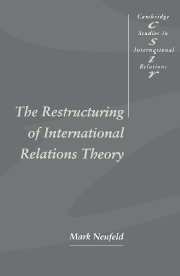Book contents
- Frontmatter
- Contents
- Acknowledgments
- Introduction
- 1 International Relations theory and the Aristotelian project
- 2 Defining positivism
- 3 Reflexivity and International Relations theory
- 4 Human consciousness and International Relations theory
- 5 International Relations theory and social criticism
- 6 Conclusion
- Notes
- Bibliography
- Index
- CAMBRIDGE STUDIES IN INTERNATIONAL RELATIONS
6 - Conclusion
Published online by Cambridge University Press: 15 December 2009
- Frontmatter
- Contents
- Acknowledgments
- Introduction
- 1 International Relations theory and the Aristotelian project
- 2 Defining positivism
- 3 Reflexivity and International Relations theory
- 4 Human consciousness and International Relations theory
- 5 International Relations theory and social criticism
- 6 Conclusion
- Notes
- Bibliography
- Index
- CAMBRIDGE STUDIES IN INTERNATIONAL RELATIONS
Summary
A political science which is true to its moral commitment ought at the very least to be an unpopular undertaking. At its very best, it cannot help being a subversive and revolutionary force with regard to certain vested interests — intellectual, political, economic, social in general.
Hans J. MorgenthauThe value of a theory is not decided alone by the formal criteria of truth … the value of a theory is decided by its connection with the tasks, which in the particular historical moment are taken up by progressive social forces.
Max HorkheimerThis study has concerned itself with providing an answer to a very specific question: why is it that theory oriented toward human emancipation remains poorly developed within the discipline of International Relations? We are now in a position to provide an answer to this question, both in terms of what does explain the traditional absence of emancipatory International Relations theory as well as what does not.
This absence cannot be explained by either a lack of commitment to the improvement of human welfare on the part of International Relations theorists, or a lack of awareness by these theorists as to the nature of the threats under which our planet is living.
Information
- Type
- Chapter
- Information
- The Restructuring of International Relations Theory , pp. 122 - 125Publisher: Cambridge University PressPrint publication year: 1995
